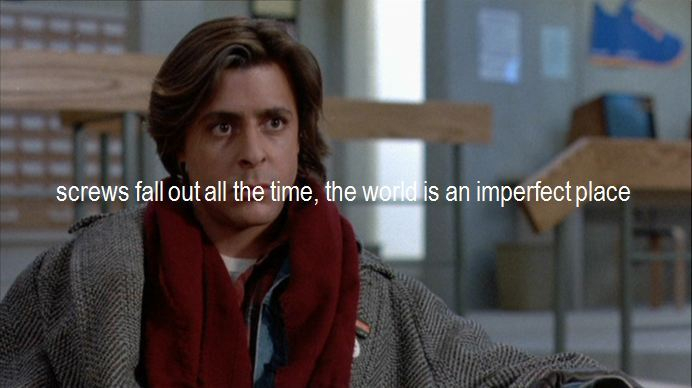In a scene from the 1980s classic, “The Breakfast Club,” the troubled kid character of John Bender, while in detention, makes this statement:
“Screws fall out. The world is an imperfect place.”
Any perfectionist breaking out in hives at that statement?
Screws fall out. Indeed, for those of us perfectionists, a crest-fallen countenance seems to be the inevitable response to pesky reality.
So, why do we have such a screwy reaction to imperfection? Well, here are a few theories.
1. “I’m scared.”
Hello, control issues.
It’s all about what makes us feel safe. There’s nothing like fear to hijack everything in our lives, while demanding we stay perfectly safe.
We apply it to our relationships and to all of our life’s circumstances.
We long for a particular person to be our rescuer. We want someone to silence pain and rid us of the monster. We want someone to make it safe for us to love and be loved, without us doing any personal work or individual heavy lifting of personal issues.
We, likewise, desire and expect that our environments, achievements, and our personal appearances will reflect back that “all is well.” We are good enough. We are going to remain good enough, and if we do, we will never be in jeopardy of chaos, change, instability, or danger.
The job, the home, the car, the kids, the public image all must preserve and protect our fragile egos. The sense of self may, indeed, shatter without that perfectly safe, perfectly kept little world of ours.
Why? Again, because we are scared. The screws must not fall out in life. The world must not be an imperfect place.
2. “I want to be right.”
When we’re not swamped with being terrified, we, perhaps, demand to be right.
We demand it of ourselves. We demand it from others.
Whereas safety may be a delicious appetizer for many of us, vindication for being made wrong may, in fact, be the yummy main course. It can promise us that revenge fantasies will favor our side of things. This is especially the case if we have come from abuse and bullying experiences.
In relationships, that may look like seeing our abuser or bully get their comeuppance. Maybe we see their utter ruin unfolding before our eyes. Maybe they are on their knees and they grovel an “I’m sorry. You were right. I was wrong.”
In circumstances, we, perhaps, can dangerously skirt a sense of entitlement. We may assert, “Well, I was horribly treated by this scenario. Therefore, I deserve to get my way now, be my own boss, have power over someone else.”
Too extreme and dark, you say? Incapable of seeing yourself that petty? Well, to that, I offer a commonly trotted out phrase: “Hurt people hurt people.”
Yeah, I know.
But before your corneas get stuck to the top of your head from the violent eye roll here, it is completely realistic to recognize how people can often negatively act out from a place of personal disempowerment. A childhood bully often bullies other kids because he is tormented by his parents and/or siblings at home. An abuser often hits their spouse because that’s what they learned as acceptable family behavior as a child.
Violence, inequity, and mistreatment are all the painful norm in many of our lives.
Day in, day out, that is our excruciating reality, until, perhaps, like the 1970s movie, “Network,” we reach a saturation point and declare at the top of our spirits and our personal mantras: “I’m mad as hell, and I’m not going to take it anymore!”
No, no, no! Screws are most certainly not going to fall out any longer! The world and my life must be perfect! And I want revenge to make it so!
3. “I want worth.”
Many of us who struggle with perfectionistic tendencies can do so because we view perfection as equal to worth or value. And, yes, some of us can tip over to an extreme perspective that, conversely, imperfection equals worthlessness.
Hello, self-esteem and core beliefs territory.
It often shows up, then, in our desperate attempts to gain our (already inherent, nothing can change that reality) self-worth through the external of other relationships with people. We can get sucked into the mindset that we are only as valuable as our associations with others. As long as we are someone else’s boyfriend, girlfriend, husband, wife, friend, business associate, or club member, then all is well. Screws are intact. Life is as it should be.
And this, likewise, can also extend to circumstances. If there is no upsetting change to the crafted world we have set up for ourselves, again, all is well. Life is good. If we continue to have that job, that house, that status, that image, that comfort zone, that good health, then we can be lulled into the false sense of security that it will always be this way and we will always be and stay this safe, because, yes, we have, indeed, crafted it that way.
Oh, great! Now, suddenly we have taken on the role of Omnipotent Deity for ourselves! What could possibly go wrong with that?
So, screws had better not fall out, huh? The world had better not be an imperfect place, huh? Wonderful, oh, so flexible, and realistic!
Acceptance: “Screws fall out.”
“…Grant me the serenity to accept the things I cannot change,
courage to change the things I can,
and wisdom to know the difference.”
~ “The Serenity Prayer,” Karl Paul Reinhold Niebuhr, American theologian
Job loss.
The end of a relationship.
Death.
A cancer diagnosis.
COVID-19.
How’s that for some unwieldy screws popping out of place, all over the place?
Most of us, especially those of us in recovery programs, are familiar with “The Serenity Prayer.” It’s a prayer about responsibility and possessing realistic expectations from life, for our lives.
It’s an anti-perfection prayer.
And no matter what our religion or belief system, it would probably do us all some good to pray more that way.
“Really?” (You, my fellow perfectionist, ask this question, don’t you? I can hear you getting uncomfortable at the thought of it just now.)
And yes, the answer is yes. Yes, we probably should worry less about perfection…and concentrate more on the living progress, complete with mistakes, relapses, and messy change. Daily. Hourly. Minute by minute, second by second, even.
This is the screwy stuff of life. Relationships and circumstances are not predictable, certainly not perfect. We are not predictable or perfect. It can all change, often, without warning, without the comforting heads up so many of us would like to have.
A pandemic occupying our lives currently makes that even more apparent.
Acceptance does not necessarily mean being giddy about something. We can accept a person, a circumstance, or a personal quirk about ourselves, and we don’t need to be ecstatically happy or thrilled about that reality. We can, from an imperfect, and hopefully loving, place, settle into a more peaceful, “it is what it is” kind of mentality.
And, “it is what it is” will not feel perfect either. It will be and feel what it will be and feel to us. And that, even, will be subject to change.
Life is change. Life is a bunch of screws that fall out of place. And, maybe, by doing so, create life events that fall into place for us.
Is it perfect? No.
Is it valuable and tailor-made for you and me? Yes.
Therefore, enjoy, or at least, accept the state of your screws, whatever they may be.


 Share on bsky
Share on bsky





Read 0 comments and reply